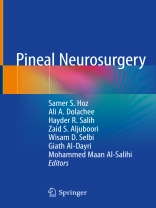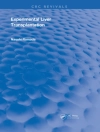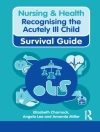This comprehensive book focuses on neurosurgical aspects of the pineal gland. By covering virtually all aspects of the pineal gland, it fills an important gap in the neurosurgical literature. Further, it approaches this vital component of the human brain from various angles: embryology, anatomy, physiology, pathology, radiology and surgical techniques.
More than 70 single-best-answer multiple-choice questions (MCQs) are distributed throughout the chapters. Offering an essential review for residents and surgeons across neurosurgical disciplines and containing most of the critical information needed to prepare for both the primary and certification exam, the book will also be of interest to neurologists, neuroscientists and medical students.
İçerik tablosu
Chapter 1 Embryology of the Pineal Gland.- Chapter 2 Anatomy of the Pineal Gland.- Chapter 3 Physiology of the Pineal Gland.- Chapter 4 Neuroimaging of the Pineal Gland.- Chapter 5 Tumors of the Pineal Gland.- Chapter 6 Non-tumorous Lesions of the Pineal Gland.- Chapter 7 Treatment and Approaches for the Pineal Gland Region.- Chapter 8 Interesting Cases of Pineal Gland Diseases and Surgery.- Chapter 9 Animal Based Surgical Training in Pineal Approaches.- Chapter 10 Evolutionary Retrace of the Third Eye.
Yazar hakkında
Samer S. Hoz, M.B.Ch. B, ABHS, FRCS (Neurosurgery)/Glasgow, Dual-trained Vascular Neurosurgeon, anatomist and researcher, Department of neurosurgery, Neurosurgery teaching hospital (NTH), Baghdad, Iraq. Director/founder Hoz Neurosurgery Simulation Laboratory, NTH. Director/founder, Neurosurgery Medical Student Elective Program in Iraq. He is the author of “Vascular neurosurgery: In multiple-choice questions”. 4/2017; Springer International Publishing., Recommended for the ABNS (American Board of Neurosurgery) primary and subspecialty exams according to the book review on “Neurosurgery” journal 2/2018. He is the first author or co-author of more than 40 peer-reviewed articles, most topics related to vascular neurosurgery, oncology and neurotrauma.
Ali A. Dolachee, M.B.Ch. B, M.D, ABHS, Neurosurgeon, assistant professor and researcher in Department of surgery, College of Medicine, University of Al-Qadisiyah, Diwaniyah, Iraq. He has aspecial interest in brain endoscopic and basal skull surgeries as well as complex spine surgery. Wide experience in head trauma doing hundreds of surgeries for blast injured patients with facing of many of unusual complications and suggested a modified decompressive craniectomy. He has helped to improve the teaching methods for medical students especially in dealing with head trauma in emergency department.
Hayder R. Salih, M.B.Ch. B, ABHS, Neurosurgeon, Department of neurosurgery,
Neurosurgery Teaching Hospital (NTH), Baghdad, Iraq. Co-Director Hoz Neurosurgery Simulation Laboratory, NTH. Co-Director, Neurosurgery Medical Student Elective Program in Iraq. He is the first author or co-author of more than 15 peer-reviewed articles, most topics related to vascular neurosurgery, oncology and neurotrauma.
Zaid S. Aljuboori, M.D. Neurosurgery, Department of Neurological surgery, University of Louisville, Kentucky, USA. He is a seventh-year neurosurgery resident at the University of Louisville in the United States. He is interested in academia, especially the fields of cerebrovascular and skull base neurosurgery. One of his main academic goals is the use of artificial intelligence to refine existing treatment protocols in neurosurgery.
Wisam D. Selbi M.B.Ch. B, Ph.D, FRCS SN is a neurosurgical registrar in the South West Deanery, UK. Currently undertaking complex spine fellowship in Exeter spinal unit. His neurosurgical interest includes neuro-trauma, oncology and complex spine.
Giath Al-Dayri, (MD, MSc), (MD, MSc) is currently a senior resident for neurosurgery at Ludmillenstift Hospital in Meppen, Germany. He holds a master’s degree in Biomedical Engineering from the University of Bern, with a thesis titled: ‘Three Dimensional Mesenchymal Stem Cell Micro Cultures for Direct Expansion and Chondrogenic Differentiation’. He was awarded master’s degree in Translational Medicine from the University of Edinburgh, for his thesis titled ‘Translational Opportunities and Challenges in the Management of Glioblastoma Multiforme’. Among his areas of interest is the network expansion between heterogeneous science fields for optimized patient and society outcomes.
Mohammed M. Al-Salihi, is a final year medical student at University of Baghdad, College of Medicine, Baghdad, Iraq. He has special interest in neurosurgery. He is an author of more than fifteen peer-reviewed articles related to different neurosurgical topics including oncology, neurotrauma and vascular neurosurgery in notable international neurosurgical journals. In addition, he has a special interest in the human brain and the Evolution theory.












